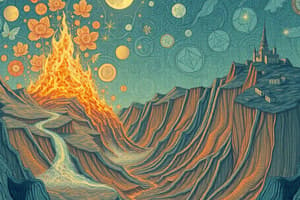Podcast
Questions and Answers
Aggressive dissolution occurs where flow is focused in preexisting openings in the rock, such as along joints, fractures, and __________.
Aggressive dissolution occurs where flow is focused in preexisting openings in the rock, such as along joints, fractures, and __________.
bedding planes
Rockfall and topples involve rocks, are very to extremely rapid, and can travel great __________.
Rockfall and topples involve rocks, are very to extremely rapid, and can travel great __________.
distances
Mudslides generally involve saturated soils moving at very to extremely rapid __________.
Mudslides generally involve saturated soils moving at very to extremely rapid __________.
velocities
Cover-collapse sinkholes develop abruptly and cause catastrophic __________.
Cover-collapse sinkholes develop abruptly and cause catastrophic __________.
Two forces affecting landslide include decline of water levels and __________.
Two forces affecting landslide include decline of water levels and __________.
It is the sliding down of soil, rocks or mud from an elevated place like a mountain or cliff, called a __________.
It is the sliding down of soil, rocks or mud from an elevated place like a mountain or cliff, called a __________.
The following are examples of geological hazards except __________.
The following are examples of geological hazards except __________.
It is slow, steady, downward movement of slope forming soil or rock, known as __________.
It is slow, steady, downward movement of slope forming soil or rock, known as __________.
The area known for its unique geological features caused by rock dissolution is referred to as __________ terrain.
The area known for its unique geological features caused by rock dissolution is referred to as __________ terrain.
A __________ sinkhole develops abruptly and can cause catastrophic damages.
A __________ sinkhole develops abruptly and can cause catastrophic damages.
Flashcards
Landslide Creep
Landslide Creep
Slow, steady, downward movement of soil or rock on a slope.
Landslide Slump
Landslide Slump
Landslide involving both soil and rock, traveling short distances at varying speeds.
Mudflow
Mudflow
Rapid downslope movement of saturated soils, often traveling great distances.
Dissolution Sinkholes
Dissolution Sinkholes
Signup and view all the flashcards
Cover-subsidence Sinkholes
Cover-subsidence Sinkholes
Signup and view all the flashcards
Cover-collapse Sinkholes
Cover-collapse Sinkholes
Signup and view all the flashcards
Driving Force (Landslide)
Driving Force (Landslide)
Signup and view all the flashcards
Resisting Force (Landslide)
Resisting Force (Landslide)
Signup and view all the flashcards
Signs of Landslides
Signs of Landslides
Signup and view all the flashcards
Signs of Sinkholes
Signs of Sinkholes
Signup and view all the flashcards
Study Notes
Landslides
- Landslides are the sliding down of soil, rocks, or mud from an elevated place.
- Types of Landlides:
- Creep: Slow, steady, downward movement of slope forming soil or rock.
- Slump: Involves both soil and rock, travels short distances, and varies in speed.
- Rock/Debris Slide: Debris from rockfalls and slumps mixes with water and travels long distances.
- Rockfall/Topple: Involves rocks, very rapid, and can travel long distances.
- Debris Flow: Initial debris slide picks up speed, erodes or follows a channel, and becomes a debris avalanche or debris flow.
- Mudflow: Involves saturated soils, moves at rapid velocities, and travels great distances.
Sinkholes
- Dissolution Sinkholes: Dissolution of limestone or dolomite is most intensive where water first contacts the rock surface.
- Cover-subsidence Sinkholes: Develop gradually, common in permeable sediments with sand.
- Cover-collapse Sinkholes: Develop abruptly, cause catastrophic damages, occur in sediments with significant clay.
- Two forces that affect landslides:
- Driving force: Causes the slope to move (e.g., steep slopes, heavy loads on the surface, rainfall).
- Resisting force: Stabilizes the slope and prevents movement (e.g., removing excess water from slopes, adding buttress material at the base).
Signs of Landslides and Sinkholes
- Landslide signs: Cracks on the ground, tilting of trees or fence posts, bulging ground, tilting of utility posts and buildings, ground water seeps to the surface, and muddy rivers.
- Sinkhole signs: Rapid appearance of a hole in the ground, dips and depressions in the yard, dead patches of grass, and sinkholes in the neighborhood.
Causes of Sinkholes
- Human-induced: Disturbance of the soil, leaking water pipes, concentration of water flow, heavy loads on the surface structures, and water impoundments (basins, ponds, dams).
Karst Terrains
- A region where the bedrock can be dissolved by groundwater, causing a unique landscape of caves, sinkholes, and springs.
Studying That Suits You
Use AI to generate personalized quizzes and flashcards to suit your learning preferences.




